Unit 3 Could you please tell me where the restrooms are单元知识点汇总 人教版九年级英语全一册
文档属性
| 名称 | Unit 3 Could you please tell me where the restrooms are单元知识点汇总 人教版九年级英语全一册 | 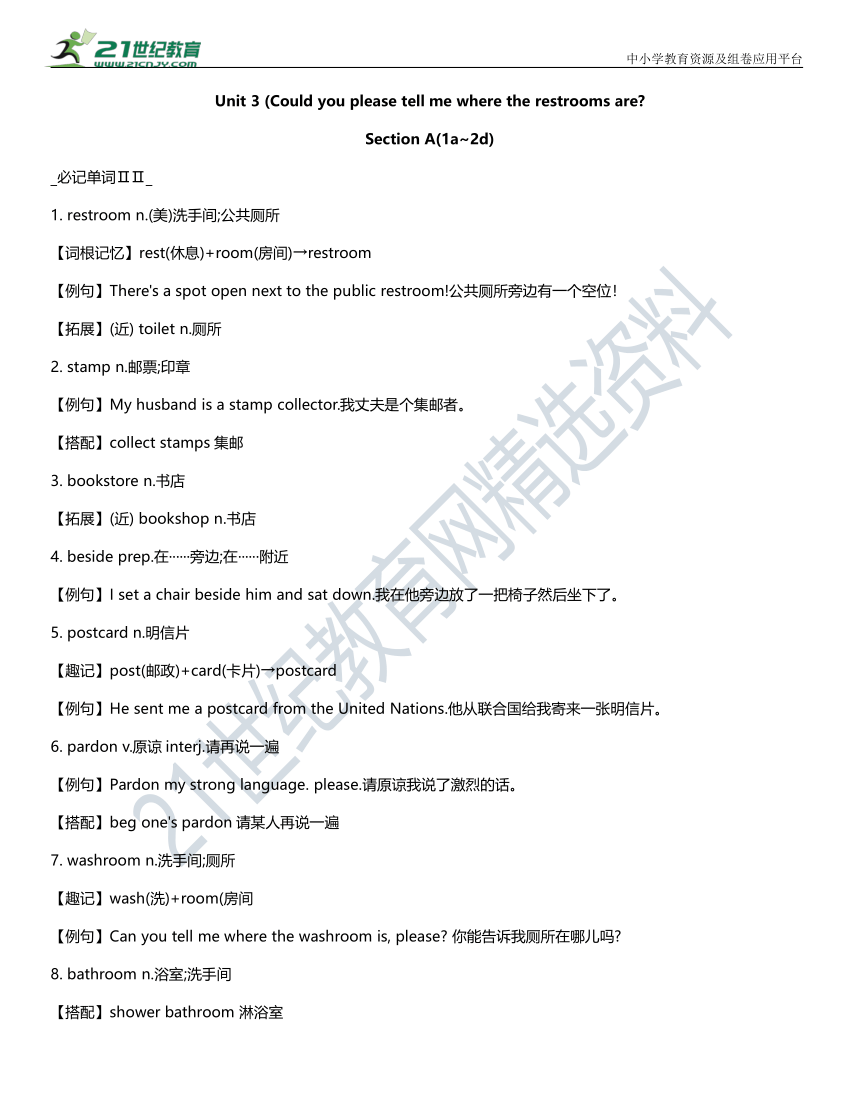 | |
| 格式 | docx | ||
| 文件大小 | 161.7KB | ||
| 资源类型 | 试卷 | ||
| 版本资源 | 人教新目标(Go for it)版 | ||
| 科目 | 英语 | ||
| 更新时间 | 2023-09-10 06:57:26 | ||
图片预览

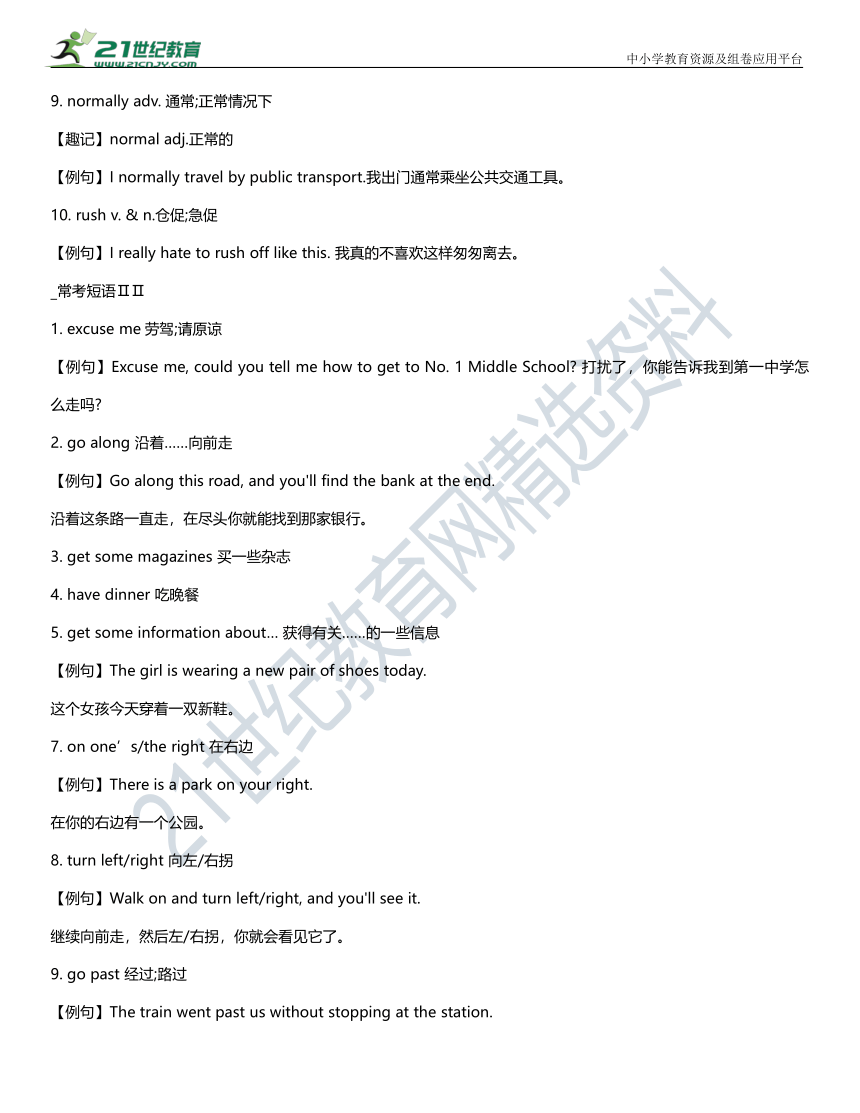
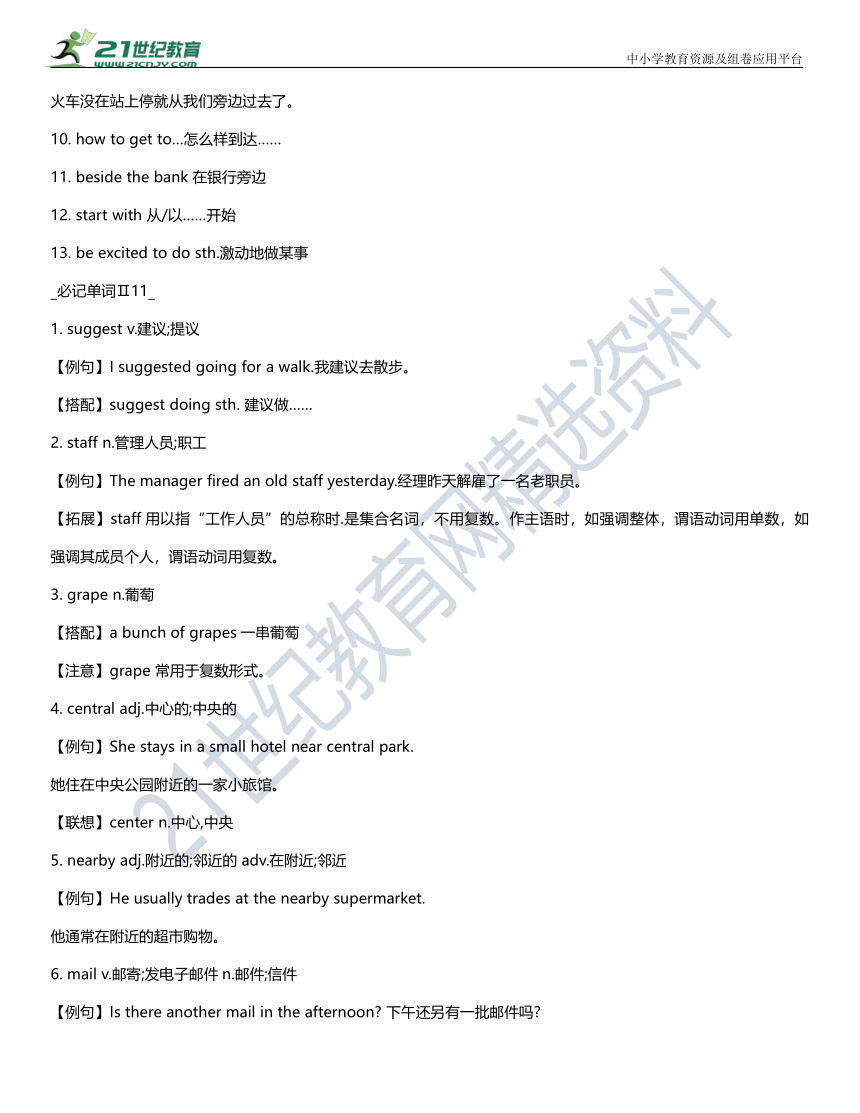
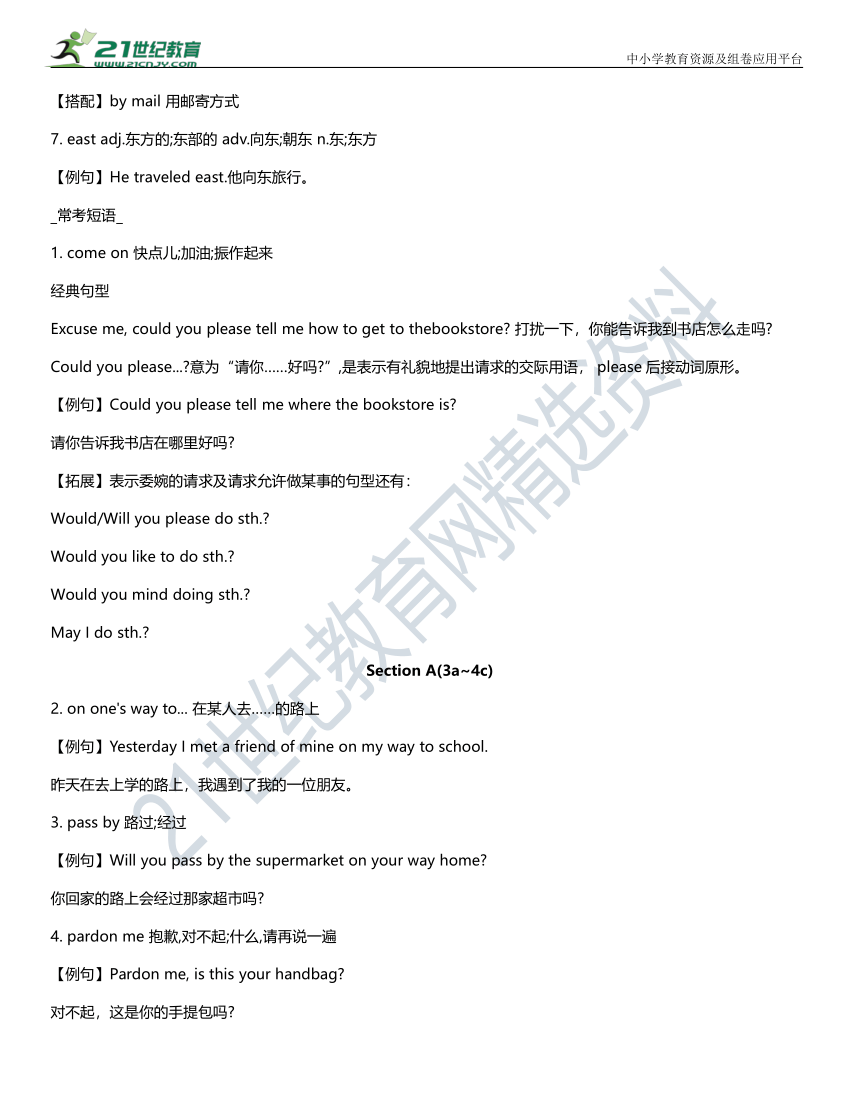
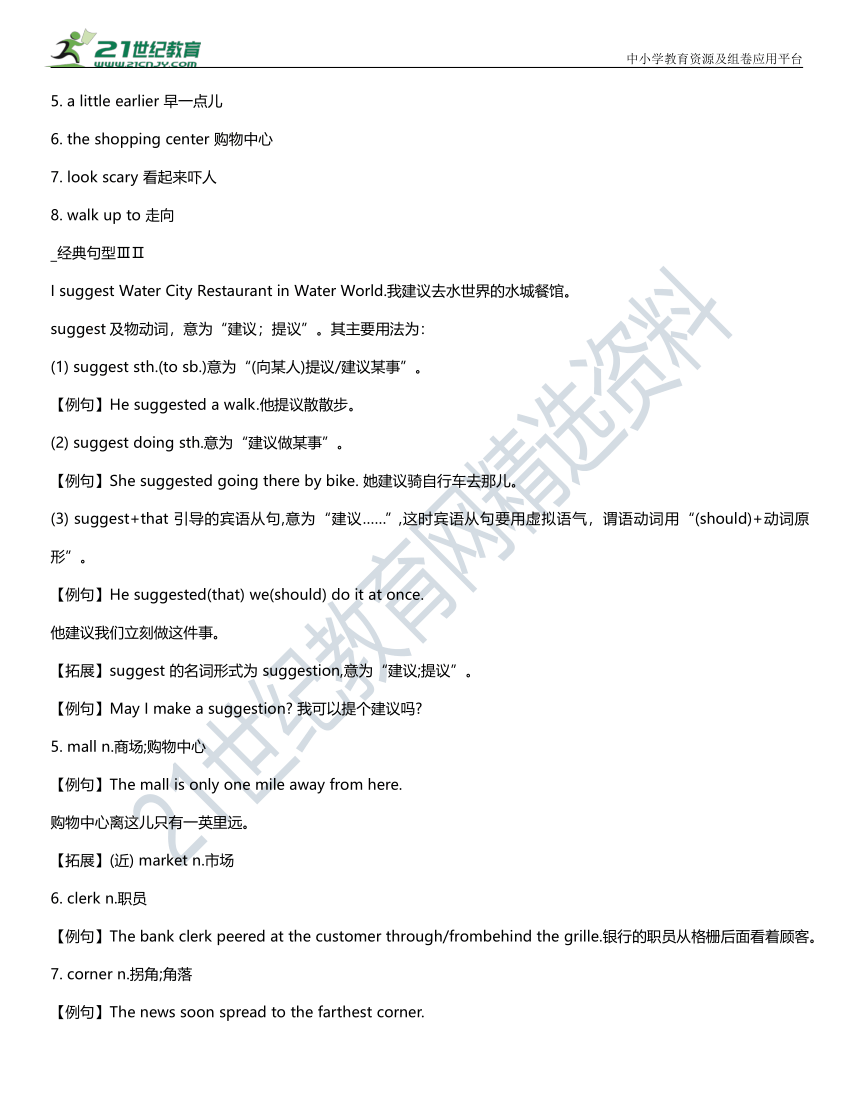
文档简介
中小学教育资源及组卷应用平台
Unit 3 (Could you please tell me where the restrooms are
Section A(1a~2d)
_必记单词ⅡⅡ_
1. restroom n.(美)洗手间;公共厕所
【词根记忆】rest(休息)+room(房间)→restroom
【例句】There's a spot open next to the public restroom!公共厕所旁边有一个空位!
【拓展】(近) toilet n.厕所
2. stamp n.邮票;印章
【例句】My husband is a stamp collector.我丈夫是个集邮者。
【搭配】collect stamps集邮
3. bookstore n.书店
【拓展】(近) bookshop n.书店
4. beside prep.在······旁边;在······附近
【例句】I set a chair beside him and sat down.我在他旁边放了一把椅子然后坐下了。
5. postcard n.明信片
【趣记】post(邮政)+card(卡片)→postcard
【例句】He sent me a postcard from the United Nations.他从联合国给我寄来一张明信片。
6. pardon v.原谅interj.请再说一遍
【例句】Pardon my strong language. please.请原谅我说了激烈的话。
【搭配】beg one's pardon请某人再说一遍
7. washroom n.洗手间;厕所
【趣记】wash(洗)+room(房间
【例句】Can you tell me where the washroom is, please 你能告诉我厕所在哪儿吗
8. bathroom n.浴室;洗手间
【搭配】shower bathroom 淋浴室
9. normally adv. 通常;正常情况下
【趣记】normal adj.正常的
【例句】I normally travel by public transport.我出门通常乘坐公共交通工具。
10. rush v. & n.仓促;急促
【例句】I really hate to rush off like this. 我真的不喜欢这样匆匆离去。
_常考短语ⅡⅡ
1. excuse me劳驾;请原谅
【例句】Excuse me, could you tell me how to get to No. 1 Middle School 打扰了,你能告诉我到第一中学怎么走吗
2. go along 沿着……向前走
【例句】Go along this road, and you'll find the bank at the end.
沿着这条路一直走,在尽头你就能找到那家银行。
3. get some magazines 买一些杂志
4. have dinner 吃晚餐
5. get some information about… 获得有关……的一些信息
【例句】The girl is wearing a new pair of shoes today.
这个女孩今天穿着一双新鞋。
7. on one’s/the right 在右边
【例句】There is a park on your right.
在你的右边有一个公园。
8. turn left/right 向左/右拐
【例句】Walk on and turn left/right, and you'll see it.
继续向前走,然后左/右拐,你就会看见它了。
9. go past 经过;路过
【例句】The train went past us without stopping at the station.
火车没在站上停就从我们旁边过去了。
10. how to get to…怎么样到达……
11. beside the bank 在银行旁边
12. start with 从/以……开始
13. be excited to do sth.激动地做某事
_必记单词Ⅱ11_
1. suggest v.建议;提议
【例句】I suggested going for a walk.我建议去散步。
【搭配】suggest doing sth. 建议做……
2. staff n.管理人员;职工
【例句】The manager fired an old staff yesterday.经理昨天解雇了一名老职员。
【拓展】staff用以指“工作人员”的总称时.是集合名词,不用复数。作主语时,如强调整体,谓语动词用单数,如强调其成员个人,谓语动词用复数。
3. grape n.葡萄
【搭配】a bunch of grapes一串葡萄
【注意】grape 常用于复数形式。
4. central adj.中心的;中央的
【例句】She stays in a small hotel near central park.
她住在中央公园附近的一家小旅馆。
【联想】center n.中心,中央
5. nearby adj.附近的;邻近的 adv.在附近;邻近
【例句】He usually trades at the nearby supermarket.
他通常在附近的超市购物。
6. mail v.邮寄;发电子邮件n.邮件;信件
【例句】Is there another mail in the afternoon 下午还另有一批邮件吗
【搭配】by mail 用邮寄方式
7. east adj.东方的;东部的 adv.向东;朝东 n.东;东方
【例句】He traveled east.他向东旅行。
_常考短语_
1. come on 快点儿;加油;振作起来
经典句型
Excuse me, could you please tell me how to get to thebookstore 打扰一下,你能告诉我到书店怎么走吗
Could you please... 意为“请你……好吗 ”,是表示有礼貌地提出请求的交际用语, please后接动词原形。
【例句】Could you please tell me where the bookstore is
请你告诉我书店在哪里好吗
【拓展】表示委婉的请求及请求允许做某事的句型还有:
Would/Will you please do sth.
Would you like to do sth.
Would you mind doing sth.
May I do sth.
Section A(3a~4c)
2. on one's way to... 在某人去……的路上
【例句】Yesterday I met a friend of mine on my way to school.
昨天在去上学的路上,我遇到了我的一位朋友。
3. pass by 路过;经过
【例句】Will you pass by the supermarket on your way home
你回家的路上会经过那家超市吗
4. pardon me 抱歉,对不起;什么,请再说一遍
【例句】Pardon me, is this your handbag
对不起,这是你的手提包吗
5. a little earlier 早一点儿
6. the shopping center 购物中心
7. look scary 看起来吓人
8. walk up to 走向
_经典句型ⅢⅡ
I suggest Water City Restaurant in Water World.我建议去水世界的水城餐馆。
suggest及物动词,意为“建议;提议”。其主要用法为:
(1) suggest sth.(to sb.)意为“(向某人)提议/建议某事”。
【例句】He suggested a walk.他提议散散步。
(2) suggest doing sth.意为“建议做某事”。
【例句】She suggested going there by bike. 她建议骑自行车去那儿。
(3) suggest+that 引导的宾语从句,意为“建议……”,这时宾语从句要用虚拟语气,谓语动词用“(should)+动词原形”。
【例句】He suggested(that) we(should) do it at once.
他建议我们立刻做这件事。
【拓展】suggest 的名词形式为 suggestion,意为“建议;提议”。
【例句】May I make a suggestion 我可以提个建议吗
5. mall n.商场;购物中心
【例句】The mall is only one mile away from here.
购物中心离这儿只有一英里远。
【拓展】(近) market n.市场
6. clerk n.职员
【例句】The bank clerk peered at the customer through/frombehind the grille.银行的职员从格栅后面看着顾客。
7. corner n.拐角;角落
【例句】The news soon spread to the farthest corner.
消息很快传到最远的角落。
【搭配】around the corner 在拐角处,即将来临
at the corner 在拐角处
_常考短语ⅡⅡ_
1. a good place to eat 一个吃饭的好地方
2. the corner of… ……的角落/拐角处
【例句】There is a dustbin in the corner of the room.
房间的角落里有一个垃圾桶。
3. ask about 询问
4. tell sb. to do sth.告诉某人去做某事
_必记单词|||||_
1. politely adv.礼貌地;客气地
【例句】Andrew politely turned down the invitation.
安德鲁有礼貌地拒绝了邀请。
【联想】polite adj.有礼貌的,客气的
2. request n. & v.要求;请求
【例句】I will ob lige any sincere request.我会答应任何诚挚的请求。
3. direction n.方向;方位
【例句】Which direction does your room face 你的房间面向哪个方向
4. correct adj.正确的;恰当的
【例句】Your answer to the question is correct.你对这个问题的回答是正确的。
【搭配】correct answers 正确的答案
5. polite adj.有礼貌的;客气的
【例句】It is not polite of you to cut the speaker short.你打断发言者的话,真不礼貌。
【搭配】be polite to sb.对某人有礼貌
It's polite(of sb.) to do sth.(某人)做某事是礼貌的
6. direct adj.直接的;直率的
【例句】I'm in direct contact with the hijackers.我与劫机者保持着直接的联系。
7. speaker n.讲(某种语言)的人;发言者
【词根记忆】spcak(说话)+cr(表示“人”的名词后缀)→spcaker
【例句】I call on Mr. Oates, the first speaker on my list.现在请名单上第一位发言者奥茨先生讲话。
8. whom pron.谁;什么人
【例句】I don't know whom he has in mind for the job.我不知道他想让谁来做这项工作。
【联想】who 的宾格形式。
9. impolite adj.不礼貌的;粗鲁的
【词根记忆】im(否定前缀)+polite(有礼貌的)→impolite
【例句】It's impolite to peep at others.偷看别人是不礼貌的。
10. address n.住址;地址;通讯处
【趣记】网购连衣裙(dress)要正确填写地址(address)
【例句】Please write your home address on the registrationform.请在这张登记表上写下你的家庭住址。
11. underground adj.地下的 n.地铁
【词根记忆】under(在……下)+ground(地面)→underground
【例句】I obtained it for one pound in the underground.
这是我在地铁花一英镑买来
12. course n.课程;学科
【例句】She took a course in philosophy.她选读了一门哲学课程。
【搭配】a course in English 一门英语课程
_常考短语ⅡⅡ
1. in different situations 在不同的情况下
2. trouble sb.麻烦某人
3. parking lot 停车场;停车区
4. on time 准时;按时
【例句】The passengers get on the plane on time.
乘客准时登机。
5. ask for help 寻求帮助
6. learn how to be polite 学习怎样才是礼貌的
7. depend on 视……而定;依靠;取决于
【例句】The price depends on the quality.价格取决于质量。
8. sound impolite 听起来很不礼貌
9. such as/for example 例如
10. spend some time doing sth.花费一些时间做某事
11. use the right language 使用适合的语言
12. communicate with sb.和某人交流
_经典句型_||||_
1. The expressions they use might depend on whom they
are speaking to or how well they know each other.他们所使用的表达方式可能取决于他们和谁说话或他们
对彼此的熟悉程度。
(1)此句为复合句, they usc 是省略了关系代词 that 或 which的定语从句,修饰先行词 the expressions; whom they are speaking to 和how well they know each other是宾语从句,作介词on的宾语。
(2) whom代词,是 who的宾格形式,意为“谁;什么人”,作动词或介词的宾语,在口语或非正式文体中常用 who来代替,但如果疑问词前有介词时则只能用 whom。
【例句】Who were you talking to just now =To whom were you talking just now 刚才你在和谁说话
2. That is because it is a very direct question.那是因为它是一个非常直接的问题。
That is becausc…意为“那是因为……”,其中 bccausc引导的句子作表语,是表语从句,说明原因。表语从句常用连词that,what, who, when, where, how, why 等引导,位于连系动词
单元语法
特殊疑问词引导宾语从句
1.引导宾语从句的疑问代词主要有 who, whom, whose, which.what, whoever, whomever, whatever, whichever等,它们在句中充当主语、宾语、定语或表语。
I wonder what is her favorite flower.我想知道她最喜欢什么花。what 作主语)
Can you tell me whom you are waiting for 你能告诉我你在等谁吗 (whom作宾语)
This book will show you what the best CEOs shorld know. 这本书会告诉你最好的执行总裁应该了解什么了。(what 作宾语)
Do you know which film they are talking about 你知道他们在谈论哪部电影吗 (which 作定语)
I accept the truth whatever it is. 我接受事实,不管它是什么。(whatever作表语)
2.引导宾语从句的疑问副词主要有 when, where, why, how.whenever, wherever, however等,它们在句中充当状语。
I don't know where he lives.我不知道他住在哪儿。(where 作地点状语。)
3.宾语从句与简单句的转换
当宾语从句是以连接代词或连接副词如 when, where,连接代词或连接副词加动词不定式,构成不定式的疑问形式作宾语,从而由一个主从复合句变为简单句。
(1)当主句中的主语与宾语从句中的主语一致时,可以将其改为简单句。
He didn't decide which shirt he would buy.
→He didn't decide which shirt to buy. 他不知道买哪件衬衫。
(2)当主句中含有双宾语时,如果间接宾语与宾语从句(直接宾语)中的主语一致时,也可以将这个主从复合句变为简单句。
Can you tell me how I can get to the past office
→Can you tell me how to get to the post office 你能告诉怎么才能到邮局吗
【例1】We lost the way in the forest, and we didn't know_.
A. where we get back
B. when did we get back
C. how we could get back
【解析】我们可采用“语序判断法”和“时态判断法”解答本题。宾语从句要用陈述语序,排除B项;本复合句的主句是一般过去时,除客观真理外,宾语从句与主句在时态上要保持一致,排除A项,故选 C。
【答案】C
【例2】—Philip has gone to New Zealand.
—Oh, can you tell me _
A. when did he leave
B. when he is leaving
C. when he left
D. when is he leaving
【解析】宾语从句应用陈述语序,排除选项 A 和 D。根据上句句意“菲利普已经去了新西兰”可知,从句的时态应该用一般过去时,故答案为 C。
【答案】C
【例3】—Are you going camping this afternoon
—A typhoon is coming. I'm not sure _the road to the
mountains will be closed.
A. whichB. whatC. whetherD. why
【解析】我们可用“联系上下文法”解答本题。which 意为“哪一个”;what 意为“什么”;whether 意为“是否”; why 意为“为什么”。由上句“台风就要来了。”可推知我不确定通往大山的路“是否”关闭,故选 C。
【答案】C
Unit 3 (Could you please tell me where the restrooms are
Section A(1a~2d)
_必记单词ⅡⅡ_
1. restroom n.(美)洗手间;公共厕所
【词根记忆】rest(休息)+room(房间)→restroom
【例句】There's a spot open next to the public restroom!公共厕所旁边有一个空位!
【拓展】(近) toilet n.厕所
2. stamp n.邮票;印章
【例句】My husband is a stamp collector.我丈夫是个集邮者。
【搭配】collect stamps集邮
3. bookstore n.书店
【拓展】(近) bookshop n.书店
4. beside prep.在······旁边;在······附近
【例句】I set a chair beside him and sat down.我在他旁边放了一把椅子然后坐下了。
5. postcard n.明信片
【趣记】post(邮政)+card(卡片)→postcard
【例句】He sent me a postcard from the United Nations.他从联合国给我寄来一张明信片。
6. pardon v.原谅interj.请再说一遍
【例句】Pardon my strong language. please.请原谅我说了激烈的话。
【搭配】beg one's pardon请某人再说一遍
7. washroom n.洗手间;厕所
【趣记】wash(洗)+room(房间
【例句】Can you tell me where the washroom is, please 你能告诉我厕所在哪儿吗
8. bathroom n.浴室;洗手间
【搭配】shower bathroom 淋浴室
9. normally adv. 通常;正常情况下
【趣记】normal adj.正常的
【例句】I normally travel by public transport.我出门通常乘坐公共交通工具。
10. rush v. & n.仓促;急促
【例句】I really hate to rush off like this. 我真的不喜欢这样匆匆离去。
_常考短语ⅡⅡ
1. excuse me劳驾;请原谅
【例句】Excuse me, could you tell me how to get to No. 1 Middle School 打扰了,你能告诉我到第一中学怎么走吗
2. go along 沿着……向前走
【例句】Go along this road, and you'll find the bank at the end.
沿着这条路一直走,在尽头你就能找到那家银行。
3. get some magazines 买一些杂志
4. have dinner 吃晚餐
5. get some information about… 获得有关……的一些信息
【例句】The girl is wearing a new pair of shoes today.
这个女孩今天穿着一双新鞋。
7. on one’s/the right 在右边
【例句】There is a park on your right.
在你的右边有一个公园。
8. turn left/right 向左/右拐
【例句】Walk on and turn left/right, and you'll see it.
继续向前走,然后左/右拐,你就会看见它了。
9. go past 经过;路过
【例句】The train went past us without stopping at the station.
火车没在站上停就从我们旁边过去了。
10. how to get to…怎么样到达……
11. beside the bank 在银行旁边
12. start with 从/以……开始
13. be excited to do sth.激动地做某事
_必记单词Ⅱ11_
1. suggest v.建议;提议
【例句】I suggested going for a walk.我建议去散步。
【搭配】suggest doing sth. 建议做……
2. staff n.管理人员;职工
【例句】The manager fired an old staff yesterday.经理昨天解雇了一名老职员。
【拓展】staff用以指“工作人员”的总称时.是集合名词,不用复数。作主语时,如强调整体,谓语动词用单数,如强调其成员个人,谓语动词用复数。
3. grape n.葡萄
【搭配】a bunch of grapes一串葡萄
【注意】grape 常用于复数形式。
4. central adj.中心的;中央的
【例句】She stays in a small hotel near central park.
她住在中央公园附近的一家小旅馆。
【联想】center n.中心,中央
5. nearby adj.附近的;邻近的 adv.在附近;邻近
【例句】He usually trades at the nearby supermarket.
他通常在附近的超市购物。
6. mail v.邮寄;发电子邮件n.邮件;信件
【例句】Is there another mail in the afternoon 下午还另有一批邮件吗
【搭配】by mail 用邮寄方式
7. east adj.东方的;东部的 adv.向东;朝东 n.东;东方
【例句】He traveled east.他向东旅行。
_常考短语_
1. come on 快点儿;加油;振作起来
经典句型
Excuse me, could you please tell me how to get to thebookstore 打扰一下,你能告诉我到书店怎么走吗
Could you please... 意为“请你……好吗 ”,是表示有礼貌地提出请求的交际用语, please后接动词原形。
【例句】Could you please tell me where the bookstore is
请你告诉我书店在哪里好吗
【拓展】表示委婉的请求及请求允许做某事的句型还有:
Would/Will you please do sth.
Would you like to do sth.
Would you mind doing sth.
May I do sth.
Section A(3a~4c)
2. on one's way to... 在某人去……的路上
【例句】Yesterday I met a friend of mine on my way to school.
昨天在去上学的路上,我遇到了我的一位朋友。
3. pass by 路过;经过
【例句】Will you pass by the supermarket on your way home
你回家的路上会经过那家超市吗
4. pardon me 抱歉,对不起;什么,请再说一遍
【例句】Pardon me, is this your handbag
对不起,这是你的手提包吗
5. a little earlier 早一点儿
6. the shopping center 购物中心
7. look scary 看起来吓人
8. walk up to 走向
_经典句型ⅢⅡ
I suggest Water City Restaurant in Water World.我建议去水世界的水城餐馆。
suggest及物动词,意为“建议;提议”。其主要用法为:
(1) suggest sth.(to sb.)意为“(向某人)提议/建议某事”。
【例句】He suggested a walk.他提议散散步。
(2) suggest doing sth.意为“建议做某事”。
【例句】She suggested going there by bike. 她建议骑自行车去那儿。
(3) suggest+that 引导的宾语从句,意为“建议……”,这时宾语从句要用虚拟语气,谓语动词用“(should)+动词原形”。
【例句】He suggested(that) we(should) do it at once.
他建议我们立刻做这件事。
【拓展】suggest 的名词形式为 suggestion,意为“建议;提议”。
【例句】May I make a suggestion 我可以提个建议吗
5. mall n.商场;购物中心
【例句】The mall is only one mile away from here.
购物中心离这儿只有一英里远。
【拓展】(近) market n.市场
6. clerk n.职员
【例句】The bank clerk peered at the customer through/frombehind the grille.银行的职员从格栅后面看着顾客。
7. corner n.拐角;角落
【例句】The news soon spread to the farthest corner.
消息很快传到最远的角落。
【搭配】around the corner 在拐角处,即将来临
at the corner 在拐角处
_常考短语ⅡⅡ_
1. a good place to eat 一个吃饭的好地方
2. the corner of… ……的角落/拐角处
【例句】There is a dustbin in the corner of the room.
房间的角落里有一个垃圾桶。
3. ask about 询问
4. tell sb. to do sth.告诉某人去做某事
_必记单词|||||_
1. politely adv.礼貌地;客气地
【例句】Andrew politely turned down the invitation.
安德鲁有礼貌地拒绝了邀请。
【联想】polite adj.有礼貌的,客气的
2. request n. & v.要求;请求
【例句】I will ob lige any sincere request.我会答应任何诚挚的请求。
3. direction n.方向;方位
【例句】Which direction does your room face 你的房间面向哪个方向
4. correct adj.正确的;恰当的
【例句】Your answer to the question is correct.你对这个问题的回答是正确的。
【搭配】correct answers 正确的答案
5. polite adj.有礼貌的;客气的
【例句】It is not polite of you to cut the speaker short.你打断发言者的话,真不礼貌。
【搭配】be polite to sb.对某人有礼貌
It's polite(of sb.) to do sth.(某人)做某事是礼貌的
6. direct adj.直接的;直率的
【例句】I'm in direct contact with the hijackers.我与劫机者保持着直接的联系。
7. speaker n.讲(某种语言)的人;发言者
【词根记忆】spcak(说话)+cr(表示“人”的名词后缀)→spcaker
【例句】I call on Mr. Oates, the first speaker on my list.现在请名单上第一位发言者奥茨先生讲话。
8. whom pron.谁;什么人
【例句】I don't know whom he has in mind for the job.我不知道他想让谁来做这项工作。
【联想】who 的宾格形式。
9. impolite adj.不礼貌的;粗鲁的
【词根记忆】im(否定前缀)+polite(有礼貌的)→impolite
【例句】It's impolite to peep at others.偷看别人是不礼貌的。
10. address n.住址;地址;通讯处
【趣记】网购连衣裙(dress)要正确填写地址(address)
【例句】Please write your home address on the registrationform.请在这张登记表上写下你的家庭住址。
11. underground adj.地下的 n.地铁
【词根记忆】under(在……下)+ground(地面)→underground
【例句】I obtained it for one pound in the underground.
这是我在地铁花一英镑买来
12. course n.课程;学科
【例句】She took a course in philosophy.她选读了一门哲学课程。
【搭配】a course in English 一门英语课程
_常考短语ⅡⅡ
1. in different situations 在不同的情况下
2. trouble sb.麻烦某人
3. parking lot 停车场;停车区
4. on time 准时;按时
【例句】The passengers get on the plane on time.
乘客准时登机。
5. ask for help 寻求帮助
6. learn how to be polite 学习怎样才是礼貌的
7. depend on 视……而定;依靠;取决于
【例句】The price depends on the quality.价格取决于质量。
8. sound impolite 听起来很不礼貌
9. such as/for example 例如
10. spend some time doing sth.花费一些时间做某事
11. use the right language 使用适合的语言
12. communicate with sb.和某人交流
_经典句型_||||_
1. The expressions they use might depend on whom they
are speaking to or how well they know each other.他们所使用的表达方式可能取决于他们和谁说话或他们
对彼此的熟悉程度。
(1)此句为复合句, they usc 是省略了关系代词 that 或 which的定语从句,修饰先行词 the expressions; whom they are speaking to 和how well they know each other是宾语从句,作介词on的宾语。
(2) whom代词,是 who的宾格形式,意为“谁;什么人”,作动词或介词的宾语,在口语或非正式文体中常用 who来代替,但如果疑问词前有介词时则只能用 whom。
【例句】Who were you talking to just now =To whom were you talking just now 刚才你在和谁说话
2. That is because it is a very direct question.那是因为它是一个非常直接的问题。
That is becausc…意为“那是因为……”,其中 bccausc引导的句子作表语,是表语从句,说明原因。表语从句常用连词that,what, who, when, where, how, why 等引导,位于连系动词
单元语法
特殊疑问词引导宾语从句
1.引导宾语从句的疑问代词主要有 who, whom, whose, which.what, whoever, whomever, whatever, whichever等,它们在句中充当主语、宾语、定语或表语。
I wonder what is her favorite flower.我想知道她最喜欢什么花。what 作主语)
Can you tell me whom you are waiting for 你能告诉我你在等谁吗 (whom作宾语)
This book will show you what the best CEOs shorld know. 这本书会告诉你最好的执行总裁应该了解什么了。(what 作宾语)
Do you know which film they are talking about 你知道他们在谈论哪部电影吗 (which 作定语)
I accept the truth whatever it is. 我接受事实,不管它是什么。(whatever作表语)
2.引导宾语从句的疑问副词主要有 when, where, why, how.whenever, wherever, however等,它们在句中充当状语。
I don't know where he lives.我不知道他住在哪儿。(where 作地点状语。)
3.宾语从句与简单句的转换
当宾语从句是以连接代词或连接副词如 when, where,连接代词或连接副词加动词不定式,构成不定式的疑问形式作宾语,从而由一个主从复合句变为简单句。
(1)当主句中的主语与宾语从句中的主语一致时,可以将其改为简单句。
He didn't decide which shirt he would buy.
→He didn't decide which shirt to buy. 他不知道买哪件衬衫。
(2)当主句中含有双宾语时,如果间接宾语与宾语从句(直接宾语)中的主语一致时,也可以将这个主从复合句变为简单句。
Can you tell me how I can get to the past office
→Can you tell me how to get to the post office 你能告诉怎么才能到邮局吗
【例1】We lost the way in the forest, and we didn't know_.
A. where we get back
B. when did we get back
C. how we could get back
【解析】我们可采用“语序判断法”和“时态判断法”解答本题。宾语从句要用陈述语序,排除B项;本复合句的主句是一般过去时,除客观真理外,宾语从句与主句在时态上要保持一致,排除A项,故选 C。
【答案】C
【例2】—Philip has gone to New Zealand.
—Oh, can you tell me _
A. when did he leave
B. when he is leaving
C. when he left
D. when is he leaving
【解析】宾语从句应用陈述语序,排除选项 A 和 D。根据上句句意“菲利普已经去了新西兰”可知,从句的时态应该用一般过去时,故答案为 C。
【答案】C
【例3】—Are you going camping this afternoon
—A typhoon is coming. I'm not sure _the road to the
mountains will be closed.
A. whichB. whatC. whetherD. why
【解析】我们可用“联系上下文法”解答本题。which 意为“哪一个”;what 意为“什么”;whether 意为“是否”; why 意为“为什么”。由上句“台风就要来了。”可推知我不确定通往大山的路“是否”关闭,故选 C。
【答案】C
同课章节目录
- Unit 1 How can we become good learners.
- Section A
- Section B
- Unit 2 I think that mooncakes are delicious!
- Section A
- Section B
- Unit 3 Could you please tell me where the restroom
- Section A
- Section B
- Unit 4 I used to be afraid of the dark.
- Section A
- Section B
- Unit 5 What are the shirts made of?
- Section A
- Section B
- Review of Units 1-5
- Unit 6 When was it invented?
- Section A
- Section B
- Unit 7 Teenagers should be allowed to choose their
- Section A
- Section B
- Unit 8 It must belong to Carla.
- Section A
- Section B
- Unit 9 I like music that I can dance to.
- Section A
- Section B
- Unit 10 You're supposed to shake hands.
- Section A
- Section B
- Review of Units 6-10
- Unit 11 Sad movies make me cry.
- Section A
- Section B
- Unit 12 Life is full of the unexpected
- Section A
- Section B
- Unit 13 We're trying to save the earth!
- Section A
- Section B
- Unit 14 I remember meeting all of you in Grade 7.
- Section A
- Section B
- Review of Units 11-14
